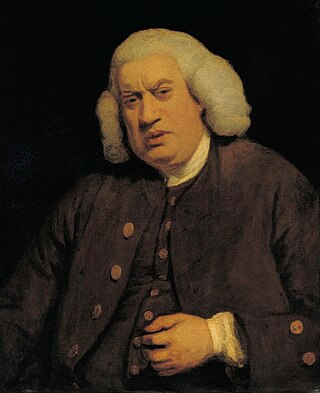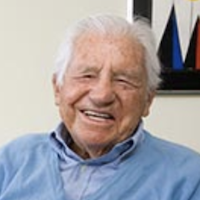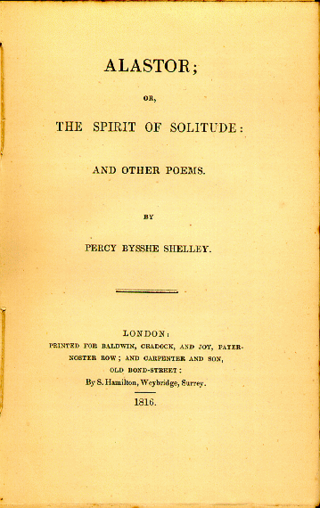Related Research Articles

Romanticism was an artistic and intellectual movement that originated in Europe towards the end of the 18th century. The purpose of the movement was to advocate for the importance of subjectivity, imagination, and appreciation of nature in society and culture during the Age of Enlightenment and the Industrial Revolution.

William Butler Yeats was an Irish poet, dramatist and writer, and one of the foremost figures of 20th-century literature. He was a driving force behind the Irish Literary Revival, and along with Lady Gregory founded the Abbey Theatre, serving as its chief during its early years. He was awarded the 1923 Nobel Prize in Literature, and later served two terms as a Senator of the Irish Free State.

Samuel Johnson, often called Dr Johnson, was an English writer who made lasting contributions as a poet, playwright, essayist, moralist, literary critic, sermonist, biographer, editor, and lexicographer. The Oxford Dictionary of National Biography calls him "arguably the most distinguished man of letters in English history".

A genre of arts criticism, literary criticism or literary studies is the study, evaluation, and interpretation of literature. Modern literary criticism is often influenced by literary theory, which is the philosophical analysis of literature's goals and methods. Although the two activities are closely related, literary critics are not always, and have not always been, theorists.

Modern lyric poetry is a formal type of poetry which expresses personal emotions or feelings, typically spoken in the first person.

Sir Philip Sidney was an English poet, courtier, scholar and soldier who is remembered as one of the most prominent figures of the Elizabethan age. His works include a sonnet sequence, Astrophel and Stella, a treatise, The Defence of Poesy and a pastoral romance, The Countess of Pembroke's Arcadia.

This article focuses on poetry from the UK written in the English language. The article does not cover poetry from other countries where the English language is spoken, including Republican Ireland after December 1922.
Dramatic monologue is a type of poetry written in the form of a speech of an individual character. M.H. Abrams notes the following three features of the dramatic monologue as it applies to poetry:
- The single person, who is patently not the poet, utters the speech that makes up the whole of the poem, in a specific situation at a critical moment […].
- This person addresses and interacts with one or more other people; but we know of the auditors' presence, and what they say and do, only from clues in the discourse of the single speaker.
- The main principle controlling the poet's choice and formulation of what the lyric speaker says is to reveal to the reader, in a way that enhances its interest, the speaker's temperament and character.
The "Graveyard Poets", also termed "Churchyard Poets", were a number of pre-Romantic poets of the 18th century characterised by their gloomy meditations on mortality, "skulls and coffins, epitaphs and worms" elicited by the presence of the graveyard. Moving beyond the elegy lamenting a single death, their purpose was rarely sensationalist. As the century progressed, "graveyard" poetry increasingly expressed a feeling for the "sublime" and uncanny, and an antiquarian interest in ancient English poetic forms and folk poetry. The "graveyard poets" are often recognized as precursors of the Gothic literary genre, as well as the Romantic movement.

Romantic poetry is the poetry of the Romantic era, an artistic, literary, musical and intellectual movement that originated in Europe towards the end of the 18th century. It involved a reaction against prevailing Enlightenment ideas of the 18th century, and lasted approximately from 1800 to 1850. Romantic poets rebelled against the style of poetry from the eighteenth century which was based around epics, odes, satires, elegies, epistles and songs.

Meyer Howard Abrams, usually cited as M. H. Abrams, was an American literary critic, known for works on romanticism, in particular his book The Mirror and the Lamp. Under Abrams's editorship, The Norton Anthology of English Literature became the standard text for undergraduate survey courses across the U.S. and a major trendsetter in literary canon formation.

Alastor, or The Spirit of Solitude is a poem by Percy Bysshe Shelley, written from 10 September to 14 December in 1815 in Bishopsgate, near Windsor Great Park and first published in 1816. The poem was without a title when Shelley passed it along to his contemporary and friend Thomas Love Peacock. The poem is 720 lines long. It is considered to be one of the first of Shelley's major poems.

"A Defence of Poetry" is an unfinished essay by Percy Bysshe Shelley written in February and March 1821 that the poet put aside and never completed. The text was published posthumously in 1840 in Essays, Letters from Abroad, Translations and Fragments. Its final sentence expresses Shelley's famous proposition that "poets are the unacknowledged legislators of the world."

An Apology for Poetry is a work of literary criticism by Elizabethan poet Philip Sidney. It was written in approximately 1580 and first published in 1595, after his death.

English literature is literature written in the English language from the English-speaking world. The English language has developed over the course of more than 1,400 years. The earliest forms of English, a set of Anglo-Frisian dialects brought to Great Britain by Anglo-Saxon invaders in the fifth century, are called Old English. Beowulf is the most famous work in Old English, and has achieved national epic status in England, despite being set in Scandinavia. However, following the Norman conquest of England in 1066, the written form of the Anglo-Saxon language became less common. Under the influence of the new aristocracy, French became the standard language of courts, parliament, and polite society. The English spoken after the Normans came is known as Middle English. This form of English lasted until the 1470s, when the Chancery Standard, a London-based form of English, became widespread. Geoffrey Chaucer (1343–1400), author of The Canterbury Tales, was a significant figure in the development of the legitimacy of vernacular Middle English at a time when the dominant literary languages in England were still French and Latin. The invention of the printing press by Johannes Gutenberg in 1439 also helped to standardise the language, as did the King James Bible (1611), and the Great Vowel Shift.

Percy Bysshe Shelley was a British writer who is considered as one of the major English Romantic poets. A radical in his poetry as well as in his political and social views, Shelley did not achieve fame during his lifetime, but recognition of his achievements in poetry grew steadily following his death, and he became an important influence on subsequent generations of poets, including Robert Browning, Algernon Charles Swinburne, Thomas Hardy, and W. B. Yeats. American literary critic Harold Bloom describes him as "a superb craftsman, a lyric poet without rival, and surely one of the most advanced sceptical intellects ever to write a poem."
The reception history of John Milton and his works has been a mixture of positive and negative responses, with his greatest influence being found within his poetry.
Opium and Romanticism are well-connected subjects, as readers of Romantic poetry often come into contact with literary criticisms about the influence of opium on its works. The idea that opium has had a direct effect on works of romantic poetry is still under debate; however, the literary criticism that has emerged throughout the years suggests very compelling ideas about opium and its impact on Romantic texts. Usually these criticisms tend to focus on poets such as Samuel Taylor Coleridge, Thomas De Quincey and George Crabbe.

Romanticism was an artistic, literary, and intellectual movement that originated in Europe toward the end of the 18th century. Scholars regard the publishing of William Wordsworth's and Samuel Coleridge's Lyrical Ballads in 1798 as probably the beginning of the movement in England, and the crowning of Queen Victoria in 1837 as its end. Romanticism arrived in other parts of the English-speaking world later; in the United States, about 1820.
"The Four Ages of Poetry", an essay of 1820 by Thomas Love Peacock, was both a significant study of poetry in its own right, and the stimulus for the Defence of Poetry by Shelley.
References
- ↑ C. Prendergast ed., Cultural Materialism (1995) p. 222
- ↑ Shelley, The Defence of Poetry (1821)
- ↑ Richard Holmes, Dr Johnson and Mr Savage (1994) p. 51
- ↑ D. Griffin, Patriotism and Poetry in Eighteenth-Century Britain (2005) p. 70
- ↑ J. L. Davies/D. J. Vaughan trans., The Republic of Plato (1908) p. 352
- ↑ E. B. Castle, Ancient Education and Today (1969) p. 91
- ↑ M. H. Abrams, The Mirror and the Lamp (1971) p. 16
- ↑ M. H. Abrams, The Mirror and the Lamp (1971) p. 272
- ↑ J. A van Dorsten ed, Sidney: A Defence of Poetry (1984) p. 39
- ↑ Samuel Johnson, Rasselas (1905) p. 42
- ↑ D. Griffin, Patriotism and Poetry in Eighteenth-Century Britain (2005) p. 71-2
- ↑ Quoted in J. A. Carlson, England's First Family of Writers (2007) p. 267
- ↑ I. Ousby ed., The Cambridge Guide to Literature in English (1995) p. 245
- ↑ Quoted in M. H. Abrams, The Mirror and the Lamp (1971) p. 332
- ↑ S. Chatterji, Memories of a Lost War (2001) p. 70
- ↑ W. B. Yeats, The Poems (1984) p. 155
- ↑ Tools of the Sacred